|
Equities ended the week on a positive note with several indexes overcoming losses incurred earlier in the week. Most of the indexes covered here advanced for the week. Investors continued to look to crude oil prices for guidance. Crude oil prices came under heavy pressure Tuesday after Saudi Arabia's oil minister said the big oil producer is "not banking on (supply) cuts". The comments from Ali al-Naimi threw cold water on hopes that major producers may act to stabilize the price amid a glut of global supply. News in the prior week that Saudi Arabia, Russia and two other producers would agree to a production "freeze" if others, such as Iraq and Iran, agreed to join brightened sentiment. However, talks continue.
Brexit and a plethora of economic news late in the week also influenced the markets' direction. With one day of trading remaining in February — leap day — several indexes were up for the month, helped by gains over the past two weeks.
The UK will not be the only country affected by Brexit. The European Union and the Eurozone have much to lose from a possible vote by the UK to leave as well. The referendum on whether or not the UK will remain part of the European Union will be held on Thursday, June 23. The announcement, made by Prime Minister David Cameron Saturday, followed two days of protracted negotiations with the other 27 EU government heads over Britain's demands for ''special status''.
It looks as though Mr Cameron achieved most of his goals at the summit, which was ultimately aimed at ensuring enhanced UK sovereignty over domestic policy and avoiding the EU's long-run objective of ever closer political integration. Although there were inevitably some compromises, the bottom line would appear to be that the other EU countries prefer to have the UK part of the Union rather than outside of it. However, many Eurosceptics at home seem unimpressed by the outcome and at least five cabinet ministers have indicated that they will be voting no in June. Which way the referendum will go remains unclear.
| |
|
2015 |
2016 |
% Change |
|
Index |
Dec 31 |
Feb 19 |
Feb 26 |
Week |
2016 |
| Asia/Pacific |
|
|
|
|
|
|
| Australia |
All Ordinaries |
5344.6 |
5008.3 |
4945.09 |
-1.3% |
-7.5% |
| Japan |
Nikkei 225 |
19033.7 |
15967.2 |
16188.41 |
1.4% |
-14.9% |
| Hong Kong |
Hang Seng |
21914.4 |
19285.5 |
19364.15 |
0.4% |
-11.6% |
| S. Korea |
Kospi |
1961.3 |
1916.2 |
1920.16 |
0.2% |
-2.1% |
| Singapore |
STI |
2882.7 |
2656.9 |
2649.38 |
-0.3% |
-8.1% |
| China |
Shanghai Composite |
3539.2 |
2860.0 |
2767.21 |
-3.2% |
-21.8% |
|
|
|
|
|
|
|
| India |
Sensex 30 |
26117.5 |
23709.2 |
23154.30 |
-2.3% |
-11.3% |
| Indonesia |
Jakarta Composite |
4593.0 |
4697.6 |
4733.15 |
0.8% |
3.1% |
| Malaysia |
KLCI |
1692.5 |
1674.9 |
1663.44 |
-0.7% |
-1.7% |
| Philippines |
PSEi |
6952.1 |
6792.1 |
6771.30 |
-0.3% |
-2.6% |
| Taiwan |
Taiex |
8338.1 |
8325.0 |
8411.16 |
1.0% |
0.9% |
| Thailand |
SET |
1288.0 |
1320.2 |
1343.07 |
1.7% |
4.3% |
|
|
|
|
|
|
|
| Europe |
|
|
|
|
|
|
| UK |
FTSE 100 |
6242.3 |
5950.2 |
6096.01 |
2.4% |
-2.3% |
| France |
CAC |
4637.1 |
4223.0 |
4314.57 |
2.2% |
-7.0% |
| Germany |
XETRA DAX |
10743.0 |
9388.1 |
9513.30 |
1.3% |
-11.4% |
| Italy |
FTSE MIB |
21418.4 |
16909.6 |
17483.76 |
3.4% |
-18.4% |
| Spain |
IBEX 35 |
9544.2 |
8194.2 |
8349.20 |
1.9% |
-12.5% |
| Sweden |
OMX Stockholm 30 |
1446.8 |
1356.0 |
1370.80 |
1.1% |
-5.3% |
| Switzerland |
SMI |
8818.1 |
7863.4 |
7877.03 |
0.2% |
-10.7% |
|
|
|
|
|
|
|
| North America |
|
|
|
|
|
|
| United States |
Dow |
17425.0 |
16392.0 |
17425.03 |
1.5% |
-4.5% |
|
NASDAQ |
5007.4 |
4504.4 |
5007.41 |
1.9% |
-8.3% |
|
S&P 500 |
2043.9 |
1917.8 |
2043.94 |
1.6% |
-4.7% |
| Canada |
S&P/TSX Comp. |
13010.0 |
12813.4 |
13009.95 |
-0.1% |
-1.6% |
| Mexico |
Bolsa |
42977.5 |
43375.3 |
42977.500 |
0.2% |
1.2% |
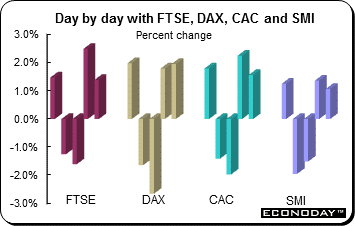 Equities advanced for a second day on Friday, elevating the indexes into positive territory for the week. Trading during the week was volatile as can be seen in the graph. On the week, the FTSE was up 2.4 percent, the CAC gained 2.2 percent, the DAX added 1.3 percent and the SMI edged up 0.2 percent. Stocks continued to fluctuate with oil prices and the possibility that there might be a production freeze. Equities advanced for a second day on Friday, elevating the indexes into positive territory for the week. Trading during the week was volatile as can be seen in the graph. On the week, the FTSE was up 2.4 percent, the CAC gained 2.2 percent, the DAX added 1.3 percent and the SMI edged up 0.2 percent. Stocks continued to fluctuate with oil prices and the possibility that there might be a production freeze.
Economic data were in focus — in addition to oil prices — during the week with flash PMI readings early in the week and a slew of data at its end. The Eurozone composite PMI eased but remained above the breakeven point of 50. The manufacturing readings however, were uniformly lower according to the flash estimates. Germany's important Ifo business confidence indicator retreated for the third straight month. At the end of the week, the closely monitored EU economic sentiment index retreated for a second month as the weak global environment and financial market concerns weighed on optimism across almost all sectors.
Over the weekend, UK Prime Minister David Cameron negotiated new terms for Britain's membership in the EU and a referendum will be held on June 23 when voters will chose whether to exit or stay in the 28-nation bloc. Equity investors managed to shrug off continued concerns over a possible "Brexit," even if the foreign exchange markets did not however.
 Equities were mixed last week but finished on a positive note thanks to gains in U.S. markets. Also contributing to the sanguine end to the week were overnight gains in crude prices, a weakening yen and soothing comments by Chinese authorities over the state of the economy and chances of more stimulus. Six indexes advanced and six declined. The SET (1.7 percent) led the indexes that gained with the Nikkei (1.4 percent) following. Losses were led by the Shanghai Composite (down 3.2 percent) and the Sensex (down 2.3 percent). The Nikkei has been pressured by the rising yen. As the fiscal year draws to a close (March 31), exporters repatriate profits. They will be directly affected by the yen's rise since the Bank of Japan introduced negative rates at their January 29 monetary policy board meeting. Equities were mixed last week but finished on a positive note thanks to gains in U.S. markets. Also contributing to the sanguine end to the week were overnight gains in crude prices, a weakening yen and soothing comments by Chinese authorities over the state of the economy and chances of more stimulus. Six indexes advanced and six declined. The SET (1.7 percent) led the indexes that gained with the Nikkei (1.4 percent) following. Losses were led by the Shanghai Composite (down 3.2 percent) and the Sensex (down 2.3 percent). The Nikkei has been pressured by the rising yen. As the fiscal year draws to a close (March 31), exporters repatriate profits. They will be directly affected by the yen's rise since the Bank of Japan introduced negative rates at their January 29 monetary policy board meeting.
Volatility returned to the Shanghai Composite. The index tumbled 6.4 percent Thursday on fears of tighter liquidity and the cooling economy. Sentiment however, received a boost when the People's Bank of China's governor Zhou Xiaochuan said the country has more room to cushion the economy and that there is no reason for the yuan to fall persistently.
A meeting in Shanghai of the Group of 20 industrialized nations got under way Friday. The plunge in equities underscores the challenge for China's policy makers as they seek to project an image of stability in the nation's financial markets as the economy slows. Finance chiefs and central bankers from the Group of 20 met in Shanghai on Friday, while the annual meeting of the legislature begins in Beijing next week. The return of volatility is also a test for China's new top securities regulator who took over last weekend after his predecessor was removed amid criticism of mismanagement. At a news conference ahead of the evening's meeting of finance chiefs from the G-20, China's top central banker, Zhou Xiaochuan, sought to reassure China's trading partners that Beijing won't drastically weaken the Chinese currency and that Beijing has sufficient tools to support the economy.
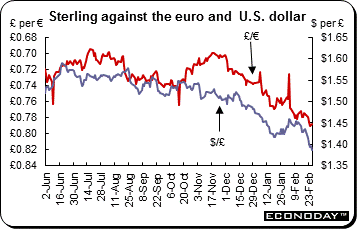 The U.S. dollar advanced against all of its major counterparts except the Canadian dollar. The U.S. currency rallied Friday after the latest economic releases including an upwardly revised estimate of GDP pointed to resilience of the U.S. economy despite weaker growth overseas. The buying sent the dollar to a three week high against the euro and a one week high against the Japanese yen. The pound sterling, meanwhile, slid to its lowest level against the dollar since 2009. The U.S. dollar advanced against all of its major counterparts except the Canadian dollar. The U.S. currency rallied Friday after the latest economic releases including an upwardly revised estimate of GDP pointed to resilience of the U.S. economy despite weaker growth overseas. The buying sent the dollar to a three week high against the euro and a one week high against the Japanese yen. The pound sterling, meanwhile, slid to its lowest level against the dollar since 2009.
Indeed, the week's big currency story was the decline of the pound sterling against the U.S. dollar. The euro also retreated indicating that the UK was not the only one to suffer should Brexit occur. The pound sold off thanks to uncertainty over the UK's future in the European Union. A British referendum on June 23 will decide whether to stay in the union. Traders say this uncertainty is damaging the appeal of the pound. Most of the blame for the pound's drop can be pinned on Boris Johnson. Over the weekend, London's mayor threw his support behind the campaign for Britain to vote in favor of leaving the European Union. That shocked currency traders Monday who sent the pound tumbling. Midway through this week, it fell through $1.40 for the first time since 2009.
|
|
2015 |
2016 |
% Change |
|
|
Dec 31 |
Feb 19 |
Feb 26 |
Week |
2016 |
| U.S. $ per currency |
|
|
|
|
|
|
| Australia |
A$ |
0.7288 |
0.715 |
0.713 |
-0.3% |
-2.2% |
| New Zealand |
NZ$ |
0.6833 |
0.664 |
0.663 |
-0.1% |
-3.0% |
| Canada |
C$ |
0.7231 |
0.726 |
0.740 |
1.9% |
2.3% |
| Eurozone |
euro (€) |
1.0871 |
1.113 |
1.094 |
-1.7% |
0.6% |
| UK |
pound sterling (£) |
1.4742 |
1.436 |
1.387 |
-3.4% |
-5.9% |
|
|
|
|
|
|
|
| Currency per U.S. $ |
|
|
|
|
|
|
| China |
yuan |
6.4937 |
6.522 |
6.540 |
-0.3% |
-0.7% |
| Hong Kong |
HK$* |
7.7501 |
7.773 |
7.775 |
0.0% |
-0.3% |
| India |
rupee |
66.1537 |
68.468 |
68.624 |
-0.2% |
-3.6% |
| Japan |
yen |
120.2068 |
112.620 |
113.880 |
-1.1% |
5.6% |
| Malaysia |
ringgit |
4.2943 |
4.208 |
4.213 |
-0.1% |
1.9% |
| Singapore |
Singapore $ |
1.4179 |
1.405 |
1.408 |
-0.2% |
0.7% |
| South Korea |
won |
1175.0600 |
1234.360 |
1238.050 |
-0.3% |
-5.1% |
| Taiwan |
Taiwan $ |
32.8620 |
33.249 |
33.340 |
-0.3% |
-1.4% |
| Thailand |
baht |
36.0100 |
35.720 |
35.750 |
-0.1% |
0.7% |
| Switzerland |
Swiss franc |
1.0014 |
0.9902 |
0.9961 |
-0.6% |
0.5% |
| *Pegged to U.S. dollar |
|
|
|
|
|
|
| Source: Bloomberg |
|
|
|
|
|
|
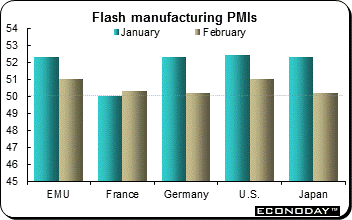 February flash composite PMI reading was 52.7, almost a point short of its final January mark and at a 13-month low. The disappointing headline was mainly due to a further loss of momentum in manufacturing where the flash PMI weighed in at just 51.0, a 1.3 point drop from its final January reading and its weakest reading in a year. The service PMI at 53.0 held up rather better but a 0.6 point decline made for its worst reading in 13 months. Manufacturing output led the way with the sub-index shedding a sizeable 1.5 points to 51.9, its worst performance in 14 months. The outlook also darkened as aggregate new orders growth decreased for a third successive month and to its slowest rate in a year. Regionally, the German composite output index was down at a 7-month low (53.8) and the French index (49.8) was back in negative growth territory. Elsewhere in the region, business activity expanded at its slowest rate since February 2015. February flash composite PMI reading was 52.7, almost a point short of its final January mark and at a 13-month low. The disappointing headline was mainly due to a further loss of momentum in manufacturing where the flash PMI weighed in at just 51.0, a 1.3 point drop from its final January reading and its weakest reading in a year. The service PMI at 53.0 held up rather better but a 0.6 point decline made for its worst reading in 13 months. Manufacturing output led the way with the sub-index shedding a sizeable 1.5 points to 51.9, its worst performance in 14 months. The outlook also darkened as aggregate new orders growth decreased for a third successive month and to its slowest rate in a year. Regionally, the German composite output index was down at a 7-month low (53.8) and the French index (49.8) was back in negative growth territory. Elsewhere in the region, business activity expanded at its slowest rate since February 2015.
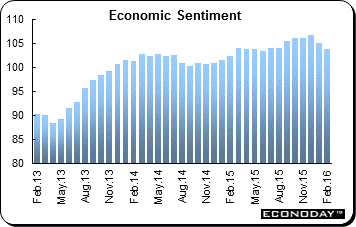 February EU Commission's economic sentiment indicator (ESI) slid to a reading of 103.8 from 105.1 in January. The decline reflected deteriorating morale in both households and industry. The former shed 2.5 points to minus 8.8 while the latter was off 1.3 points at minus 4.4, its worst mark in a year. Confidence in retail (1.6 after 2.7) also softened but construction (minus 17.5 after minus 19.0) reversed most of the previous period's decrease. Regionally national ESIs declined in all of the major countries. Germany (104.1 after 104.7) has still not seen a rise since last September and while France (102.9 after 103.4) and Spain (107.3 after 107.8) lost less ground, Italy (106.4 after 107.8) hit its lowest mark since August 2015. Price expectations were mixed. In manufacturing, expected selling prices (minus 5.5 after minus 4.1) were down sharply and at a multi-month low but consumer inflation expectations (2.7 after 2.3) posted a 7-month high while in services (3.2) there was no change. February EU Commission's economic sentiment indicator (ESI) slid to a reading of 103.8 from 105.1 in January. The decline reflected deteriorating morale in both households and industry. The former shed 2.5 points to minus 8.8 while the latter was off 1.3 points at minus 4.4, its worst mark in a year. Confidence in retail (1.6 after 2.7) also softened but construction (minus 17.5 after minus 19.0) reversed most of the previous period's decrease. Regionally national ESIs declined in all of the major countries. Germany (104.1 after 104.7) has still not seen a rise since last September and while France (102.9 after 103.4) and Spain (107.3 after 107.8) lost less ground, Italy (106.4 after 107.8) hit its lowest mark since August 2015. Price expectations were mixed. In manufacturing, expected selling prices (minus 5.5 after minus 4.1) were down sharply and at a multi-month low but consumer inflation expectations (2.7 after 2.3) posted a 7-month high while in services (3.2) there was no change.
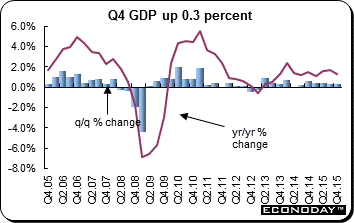 Fourth quarter gross domestic product expanded at an unrevised quarterly rate of 0.3 percent. Annual workday adjusted growth was 1.3 percent, also as estimated in the flash report. Unadjusted real GDP was up 2.1 percent on the year. Although a 0.3 percent quarterly rise in household consumption was only half that seen in the previous period, investment increased a very solid 2.4 percent, up from just 0.5 percent last time. Within this, construction gained 2.2 percent while equipment spending advanced 1.0 percent. With government expenditure increasing 1.0 percent or twice its third quarter pace, total domestic demand was up a respectable 0.8 percent following a 0.6 percent rise previously. Stock building added just 0.1 percentage point. Accordingly, the economy would have expanded a good deal more quickly but for a 0.5 percentage point hit from net foreign trade. This reflected a 0.6 percent drop in exports, compounded by a 0.5 percent gain in imports. Fourth quarter gross domestic product expanded at an unrevised quarterly rate of 0.3 percent. Annual workday adjusted growth was 1.3 percent, also as estimated in the flash report. Unadjusted real GDP was up 2.1 percent on the year. Although a 0.3 percent quarterly rise in household consumption was only half that seen in the previous period, investment increased a very solid 2.4 percent, up from just 0.5 percent last time. Within this, construction gained 2.2 percent while equipment spending advanced 1.0 percent. With government expenditure increasing 1.0 percent or twice its third quarter pace, total domestic demand was up a respectable 0.8 percent following a 0.6 percent rise previously. Stock building added just 0.1 percentage point. Accordingly, the economy would have expanded a good deal more quickly but for a 0.5 percentage point hit from net foreign trade. This reflected a 0.6 percent drop in exports, compounded by a 0.5 percent gain in imports.
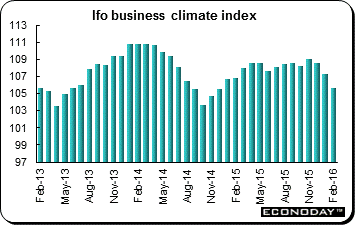 February Ifo overall business climate indicator dropped nearly 2 points to 105.7, its third decline in a row and its lowest reading since December 2014. February's weakness wholly reflected a downgrading of expectations as the sub-index decreased from 102.3 to 98.8, its sharpest decline since August 2011 and its weakest level in more than three years. Current conditions actually improved with a 0.4 point gain to 112.9, their first increase in three months. The headline setback reflected broad based weakness among the major sectors. Manufacturing was down almost 5 points at 3.4, retail dropped 2.8 points to 7.2 and wholesale slid 0.8 point to 12.3. With sentiment in services off 0.9 points at 27.2, only construction (0.3 after minus 0.5) registered an increase. February Ifo overall business climate indicator dropped nearly 2 points to 105.7, its third decline in a row and its lowest reading since December 2014. February's weakness wholly reflected a downgrading of expectations as the sub-index decreased from 102.3 to 98.8, its sharpest decline since August 2011 and its weakest level in more than three years. Current conditions actually improved with a 0.4 point gain to 112.9, their first increase in three months. The headline setback reflected broad based weakness among the major sectors. Manufacturing was down almost 5 points at 3.4, retail dropped 2.8 points to 7.2 and wholesale slid 0.8 point to 12.3. With sentiment in services off 0.9 points at 27.2, only construction (0.3 after minus 0.5) registered an increase.
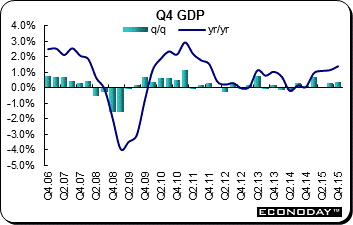 Fourth quarter gross domestic product expanded at a slightly faster rate than originally thought. A 0.3 percent quarterly increase in total output matched the July to September rate and saw annual growth increase from 1.1 percent to 1.4 percent. Household consumption was revised lower and, impacted by the November terrorist attacks in Paris, now shows a 0.2 percent decline from the third quarter. Moreover, gross fixed capital formation was revised to a 0.7 percent gain. However, government spending was revised up to a 0.5 percent increase and inventory accumulation added 0.7 percentage points to growth, rather than the 0.2 percentage points reported in the flash estimate. Exports rose 1.0 percent but were easily more than offset by a 2.5 percent increase in imports. Fourth quarter gross domestic product expanded at a slightly faster rate than originally thought. A 0.3 percent quarterly increase in total output matched the July to September rate and saw annual growth increase from 1.1 percent to 1.4 percent. Household consumption was revised lower and, impacted by the November terrorist attacks in Paris, now shows a 0.2 percent decline from the third quarter. Moreover, gross fixed capital formation was revised to a 0.7 percent gain. However, government spending was revised up to a 0.5 percent increase and inventory accumulation added 0.7 percentage points to growth, rather than the 0.2 percentage points reported in the flash estimate. Exports rose 1.0 percent but were easily more than offset by a 2.5 percent increase in imports.
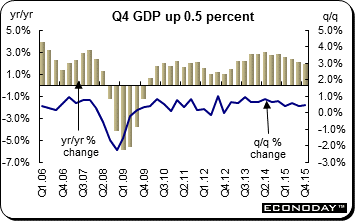 There were no revisions to the first estimate of fourth quarter GDP. GDP was up 0.5 percent on the quarter, up from 0.4 percent in the previous period. From a year ago, GDP was up 1.9 percent, down from 2.1 percent in the third quarter. Headline growth was largely attributable to household consumption which was up 0.7 percent from the previous quarter when it advanced 0.8 percent. This alone accounted for 0.4 percentage points of the quarterly increase in real GDP. Gross capital formation expanded 1.7 percent, down sharply from 5.1 percent. Within this gross fixed capital formation fell 0.1 percent for the second successive quarter. Business investment dropped 2.1 percent, its only decrease of the year. Government consumption increased 0.5 percent and business inventories followed a nearly 1 percentage point boost last time with a further 0.3 percentage point contribution. The headline data would have been stronger but for another negative impact from net foreign trade. There were no revisions to the first estimate of fourth quarter GDP. GDP was up 0.5 percent on the quarter, up from 0.4 percent in the previous period. From a year ago, GDP was up 1.9 percent, down from 2.1 percent in the third quarter. Headline growth was largely attributable to household consumption which was up 0.7 percent from the previous quarter when it advanced 0.8 percent. This alone accounted for 0.4 percentage points of the quarterly increase in real GDP. Gross capital formation expanded 1.7 percent, down sharply from 5.1 percent. Within this gross fixed capital formation fell 0.1 percent for the second successive quarter. Business investment dropped 2.1 percent, its only decrease of the year. Government consumption increased 0.5 percent and business inventories followed a nearly 1 percentage point boost last time with a further 0.3 percentage point contribution. The headline data would have been stronger but for another negative impact from net foreign trade.
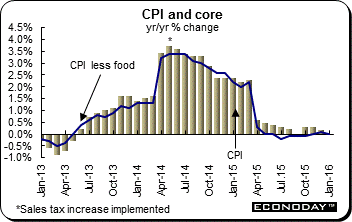 January consumer price index was unchanged on the year as expected. Core CPI excluding fresh food also was unchanged. However, excluding food and energy, the index was up 0.7 percent from a year ago. The data suggest that persistent declines in energy costs will keep inflation well below the Bank of Japan's 2 percent target. The data underscores the challenges the Bank of Japan faces, even after its shock decision last month to adopt negative interest rates, in generating a positive cycle in which rising corporate profits drive up wages and consumption. January consumer price index was unchanged on the year as expected. Core CPI excluding fresh food also was unchanged. However, excluding food and energy, the index was up 0.7 percent from a year ago. The data suggest that persistent declines in energy costs will keep inflation well below the Bank of Japan's 2 percent target. The data underscores the challenges the Bank of Japan faces, even after its shock decision last month to adopt negative interest rates, in generating a positive cycle in which rising corporate profits drive up wages and consumption.
Economic data were mixed with flash PMIs mostly disappointing. Second estimates of GDP were basically unchanged from the original estimates in Germany, France and the UK. But in the U.S., the estimate received an upward revision. Once again, Japan's CPI was flat with no signs of inflation, leaving the Bank of Japan in a quandary after its move to negative interest rates. Equities in Europe rallied while those in the Asia Pacific were mixed. The Group of 20 met in Shanghai. Investors are looking for reassurance from world leaders that they would stand ready to act if economic conditions worsen further.
The first week of the month is always a busy one for new economic data. February PMIs will be studied for clues on growth going forward. Japan releases January data for industrial output, retail sales, household spending and unemployment. Australia and Canada post fourth quarter GDP. The Reserve Bank of Australia meets — no change in policy is anticipated.
| Central Bank activities |
|
| March 1 |
Australia |
Reserve Bank of Australia Monetary Policy Announcement |
| March 2 |
United States |
Federal Reserve Beige Book Published |
| |
|
|
| The following indicators will be released this week... |
| Europe |
|
|
| February 29 |
Eurozone |
Harmonized Index of Consumer Prices (February flash) |
|
Germany |
Retail Sales (January) |
| March 1 |
Eurozone |
PMI Manufacturing (February) |
|
|
Unemployment (January) |
|
Germany |
PMI Manufacturing (February) |
|
|
Unemployment (February) |
|
France |
PMI Manufacturing (February) |
|
UK |
PMI Manufacturing (February) |
| March 2 |
Eurozone |
Producer Price Index (January) |
| March 3 |
Eurozone |
PMI Services & Composite (February) |
|
|
Retail Sales (January) |
|
Germany |
PMI Services & Composite (February) |
|
France |
PMI Services & Composite (February) |
|
|
ILO Unemployment (Q4.2015) |
|
UK |
PMI Services (February) |
| March 4 |
Italy |
Gross Domestic Product (Q4.2015 final) |
| |
|
|
| Asia/Pacific |
|
|
| February 29 |
Japan |
Industrial Production (January) |
|
|
Retail Sales (January) |
| March 1 |
Japan |
Household Spending (January) |
|
|
Unemployment Rate (January) |
|
|
PMI Manufacturing (February) |
|
China |
PMI Manufacturing (February) |
|
|
CFLP Manufacturing Index (February) |
| March 2 |
Australia |
Gross Domestic Product (Q4.2015) |
| March 3 |
Japan |
PMI Services (February) |
|
Australia |
Merchandise Trade Balance (January) |
| March 4 |
Australia |
Retail Sales (January) |
| |
|
|
| Americas |
|
|
| March 1 |
Canada |
Gross Domestic Product (Q4.2015) |
|
|
Monthly Gross Domestic Product (December) |
| March 4 |
Canada |
International Trade (January) |
Anne D Picker is the author of International Economic Indicators and Central Banks.
|

